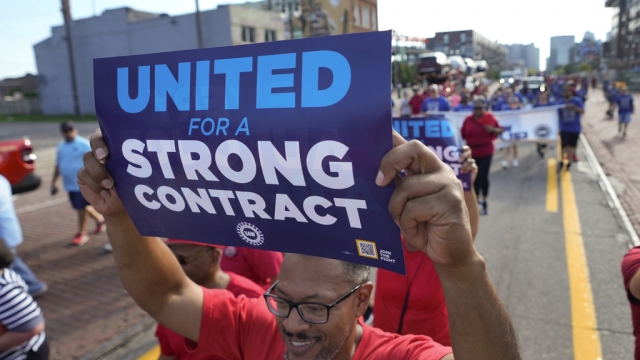As the White House expresses optimism a deal can be reached, an expert told Scripps News he is not as hopeful a strike can be avoided between the United Auto Workers union and three major automakers.
Last month, union members overwhelmingly authorized a strike against America's "Big Three" automakers, which could cause assembly lines to shut down next week. UAW President Shawn Fain said autoworkers are set to strike as soon as Sept. 14.
UAW's list of demands includes more paid time off, a 32-hour workweek, a double-digit pay increase, and an end to wage tiers. Fain said if those needs aren't met by Sept. 14, then "we gotta do what we gotta do."
Marick Masters, a business professor at Wayne State University who has studied labor issues, says there is a remote chance the two sides can come to an agreement, adding "it's going to be difficult for the parties" to settle their differences.
"Over the past 40 years, the top 1% have seen their real wages adjusted for inflation grow by over 200%," Masters said. "The bottom 90% have seen their real wages grow by only 28%. That's the reason why they have this push for higher wages. And I think it resonates across the board."
SEE MORE: UAW votes to authorize a strike against major automakers
The Biden administration is projecting a more optimistic tone. A strike could have major implications for the economy. According to a recent analysis by Anderson Economic Group, a potential UAW strike could cost the "Big Three" more than $5 billion in just 10 days.
"They're bargaining; that's what we want to see," acting Labor Secretary Julie Su told Scripps News on Wednesday. "We continue to urge that we'd like to see them arrive at a fair contract. And I say this all the time, but the only people who can say whether their contract is fair are the workers themselves. And so we really encourage continued, not just sitting at the table, but really a movement to try to arrive at a contract, but they're still in conversations."
Su added, "We're going to stay hopeful about a positive outcome there and a win-win solution."
UAW says it's ready for the picket lines. The union reportedly has $825 million in its strike fund and has raised strike pay to $500 per week.
Trending stories at Scrippsnews.com




